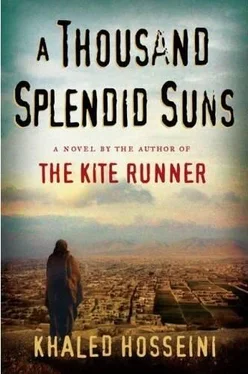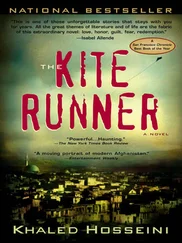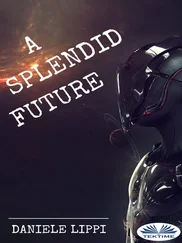"If President Bush doesn't help us," he had said, "these terrorists will damage the U.S. and Europe very soon."
A month before that, Laila had learned that the Taliban had planted TNT in the crevices of the giant Buddhas in Bamiyan and blown them apart, calling them objects of idolatry and sin. There was an outcry around the world, from the U.S. to China. Governments, historians, and archaeologists from all over the globe had written letters, pleaded with the Taliban not to demolish the two greatest historical artifacts in Afghanistan. But the Taliban had gone ahead and detonated their explosives inside the two-thousand-year-old Buddhas. They had chanted Allah-u-akbar with each blast, cheered each time the statues lost an arm or a leg in a crumbling cloud of dust. Laila remembered standing atop the bigger of the two Buddhas with Babi and Tariq, back in 1987, a breeze blowing in their sunlit faces, watching a hawk gliding in circles over the sprawling valley below. But when she heard the news of the statues' demise, Laila was numb to it. It hardly seemed to matter. How could she care about statues when her own life was crumbling dust?
Until Rasheed told her it was time to go, Laila sat on the floor in a corner of the living room, not speaking and stone-faced, her hair hanging around her face in straggly curls. No matter how much she breathed in and out, it seemed to Laila that she couldn't fill her lungs with enough air.
ON THE WAY to Karteh-Seh, Zalmai bounced in Rasheed's arms, and Aziza held Mariam's hand as she walked quickly beside her. The wind blew the dirty scarf tied under Aziza's chin and rippled the hem of her dress. Aziza was more grim now, as though she'd begun to sense, with each step, that she was being duped. Laila had not found the strength to tell Aziza the truth. She had told her that she was going to a school, a special school where the children ate and slept and didn't come home after class. Now Aziza kept pelting Laila with the same questions she had been asking for days. Did the students sleep in different rooms or all in one great big room? Would she make friends? Was she, Laila, sure that the teachers would be nice?
And, more than once, How long do I have to stay?
They stopped two blocks from the squat, barracks-style building.
"Zalmai and I will wait here," Rasheed said. "Oh, before I forget…"
He fished a stick of gum from his pocket, a parting gift, and held it out to Aziza with a stiff, magnanimous air. Aziza took it and muttered a thank-you. Laila marveled at Aziza's grace, Aziza's vast capacity for forgiveness, and her eyes filled. Her heart squeezed, and she was faint with sorrow at the thought that this afternoon Aziza would not nap beside her, that she would not feel the flimsy weight of Aziza's arm on her chest, the curve of Aziza's head pressing into her ribs, Aziza's breath warming her neck, Aziza's heels poking her belly.
When Aziza was led away, Zalmai began wailing, crying, Ziza! Ziza! He squirmed and kicked in his father's arms, called for his sister, until his attention was diverted by an organ-grinder's monkey across the street.
They walked the last two blocks alone, Mariam, Laila, and Aziza. As they approached the building, Laila could see its splintered façade, the sagging roof, the planks of wood nailed across frames with missing windows, the top of a swing set over a decaying wall.
They stopped by the door, and Laila repeated to Aziza what she had told her earlier.
"And if they ask about your father, what do you say?"
"The Mujahideen killed him," Aziza said, her mouth set with wariness.
"That's good. Aziza, do you understand?"
"Because this is a special school," Aziza said. Now that they were here, and the building was a reality, she looked shaken. Her lower lip was quivering and her eyes threatened to well up, and Laila saw how hard she was struggling to be brave. "If we tell the truth," Aziza said in a thin, breathless voice, "they won't take me. It's a special school. I want to go home."
"I'll visit all the time," Laila managed to say. "I promise."
"Me too," said Mariam. "We'll come to see you, Aziza jo, and we'll play together, just like always. It's only for a while, until your father finds work."
"They have food here," Laila said shakily. She was glad for the burqa, glad that Aziza couldn't see how she was falling apart inside it. "Here, you won't go hungry. They have rice and bread and water, and maybe even fruit."
"But you won't be here. And Khala Mariam won't be with me."
"I'll come and see you," Laila said. "All the time. Look at me, Aziza. I'll come and see you. I'm your mother. If it kills me, I'll come and see you."
THE ORPHANAGE DIRECTOR was a stooping, narrow-chested man with a pleasantly lined face. He was balding, had a shaggy beard, eyes like peas. His name was Zaman. He wore a skullcap. The left lens of his eyeglasses was chipped.
As he led them to his office, he asked Laila and Mariam their names, asked for Aziza's name too, her age. They passed through poorly lit hallways where barefoot children stepped aside and watched. They had disheveled hair or shaved scalps. They wore sweaters with frayed sleeves, ragged jeans whose knees had worn down to strings, coats patched with duct tape. Laila smelled soap and talcum, ammonia and urine, and rising apprehension in Aziza, who had begun whimpering.
Laila had a glimpse of the yard: weedy lot, rickety swing set, old tires, a deflated basketball. The rooms they passed were bare, the windows covered with sheets of plastic. A boy darted from one of the rooms and grabbed Laila's elbow, and tried to climb up into her arms. An attendant, who was cleaning up what looked like a puddle of urine, put down his mop and pried the boy off.
Zaman seemed gently proprietary with the orphans. He patted the heads of some, as he passed by, said a cordial word or two to them, tousled their hair, without condescension. The children welcomed his touch. They all looked at him, Laila thought, in hope of approval.
He showed them into his office, a room with only three folding chairs, and a disorderly desk with piles of paper scattered atop it.
"You're from Herat," Zaman said to Mariam. "I can tell from your accent."
He leaned back in his chair and laced his hands over his belly, and said he had a brother-in-law who used to live there. Even in these ordinary gestures, Laila noted a laborious quality to his movements. And though he was smiling faintly, Laila sensed something troubled and wounded beneath, disappointment and defeat glossed over with a veneer of good humor.
"He was a glassmaker," Zaman said. "He made these beautiful, jade green swans. You held them up to sunlight and they glittered inside, like the glass was filled with tiny jewels. Have you been back?"
Mariam said she hadn't.
"I'm from Kandahar myself. Have you ever been to Kandahar, hamshira? No? It's lovely. What gardens! And the grapes! Oh, the grapes. They bewitch the palate."
A few children had gathered by the door and were peeking in. Zaman gently shooed them away, in Pashto.
"Of course I love Herat too. City of artists and writers, Sufis and mystics. You know the old joke, that you can't stretch a leg in Herat without poking a poet in the rear."
Next to Laila, Aziza snorted.
Zaman feigned a gasp. "Ah, there. I've made you laugh, little hamshira. That's usually the hard part. I was worried, there, for a while. I thought I'd have to cluck like a chicken or bray like a donkey. But, there you are. And so lovely you are."
He called in an attendant to look after Aziza for a few moments. Aziza leaped onto Mariam's lap and clung to her.
"We're just going to talk, my love, "Laila said. "I'll be right here. All right? Right here."
"Why don't we go outside for a minute, Aziza jo?" Mariam said. "Your mother needs to talk to Kaka Zaman here. Just for a minute. Now, come on."
Читать дальше












